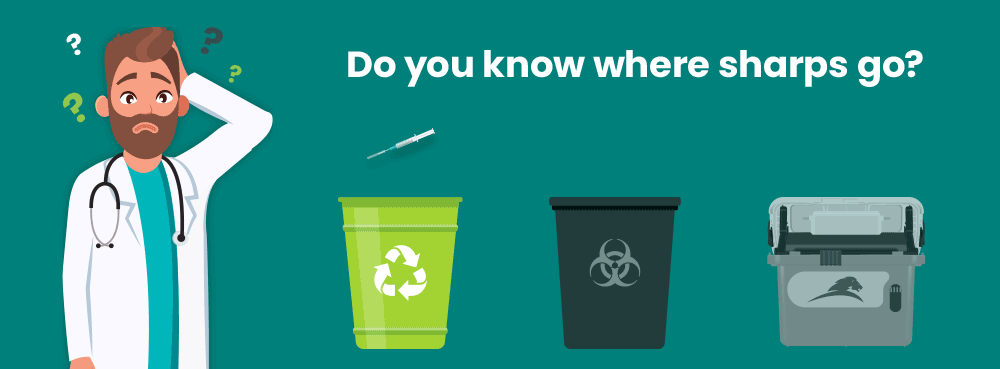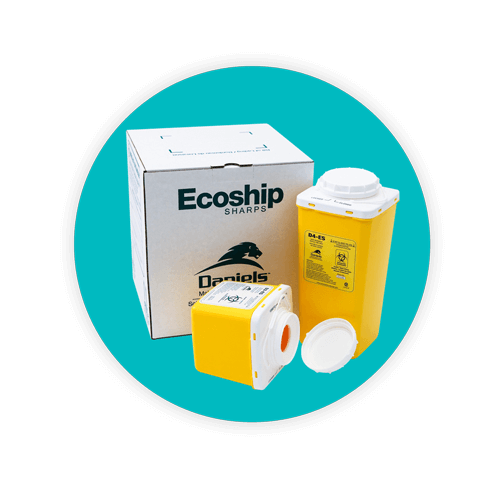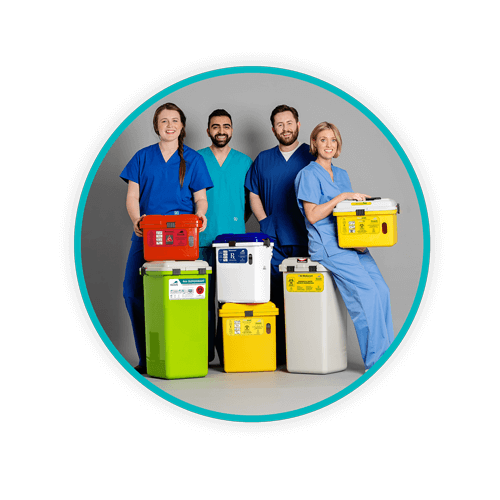Small Business Owners: Do You Know Where Your Sharps Waste Is Going?

When it comes to biomedical waste, and sharps in particular, there are numerous rules and regulations that healthcare professionals have to follow in order to stay compliant with federal and provincial laws. While large acute facilities have whole teams to handle waste compliance, plenty of healthcare waste is generated at small businesses – think dental offices, general practitioners, veterinarians, and even tattoo parlors.
One of the areas where these smaller facilities struggle the most is with sharps disposal. There are several solutions for compliant disposal of sharps waste, but many smaller waste generators are unintentionally disposing of their sharps waste in non-compliant manners.
Just like large hospital facilities, these small businesses have to understand and maintain compliance on their own to ensure full compliance. Yet, the associated penalties and fees will still apply. So, the next time someone asks if you know where your sharps waste is going, you should be confident in your answer. Here is everything you need to know:
TOPICS WE WILL COVER:
1 / Common Mistakes When Disposing of Sharps Waste
2 / What Makes this a Compliance Issue?
3 / What Are the Consequences of Non-Compliance?
4 / Sharps Disposal Best Practices
5 / Daniels Health is Here to Help
Common Mistakes When Disposing of Sharps Waste

One of the most common mistakes that small businesses make when disposing of their sharps waste is believing that their local pharmacy can compliantly take their waste. This is an easy mistake to make because in many provinces throughout Canada, pharmacies routinely accept sharps waste generated from non-commercial, at-home users (such as diabetes patients).
With these programs in place, it may seem natural that pharmacies can accept any form and amount of sharps waste, regardless of the generation. Moreover, in practice, many pharmacies may unintentionally accept waste from small businesses without knowing any better. While most pharmacist can discern differences between the waste dropped off from an at-home consumer versus waste generated at a medical facility, this won’t always be the case, especially when working with non-medical experts like pharmaceutical office assistants.
However, just because a pharmacy accepts your sharps waste doesn’t mean you’ve shifted the burden of accountability. For both the pharmacy and the small business waste generator, this is a major point of liability, and government regulators will not accept “I just didn’t know” as an answer.
What Makes this a Compliance Issue?
In Canada, waste generators have cradle-to-grave responsibility over their waste. That means that, as a generator, you are the responsible party for that waste from the moment it’s created to the moment of final disposal. There are many components that go into the cradle-to-grave responsibility, including a requirement to create waste manifests to be able to track waste as it travels out of your facility.
This, among other reasons, is why it’s so important to work with a professional medical waste disposal provider. Another reason is because medical waste disposal providers are certified to be able to transfer biomedical waste, which is regulated under the Transportation of Dangerous Goods (TGD) Act.
Back to our original scenario: Did you know that you are in violation of the Transportation of Dangerous Goods Act the moment you take sharps waste out of your office to deliver to a pharmacist? This is true even if you’re visiting a pharmacist down the hall in the same building.
What Are the Consequences of Non-Compliance?
In the case of non-compliance with the Transportation of Dangerous Goods Act, there are several potential punishments and penalties. Most severely, a person found to have contravened the act is liable for a prison sentence of up to two years. More likely in these specific instances, offenders are liable to be fined up to $50,000 for a first offence and up to $100,000 for every subsequent offence (as outlined in section 33.1 of the TDG).
That is significant fine for any small business, especially when the offence might fall under the category of “We just didn’t know any better.” Unfortunately, this is not an acceptable explanation for government regulators.
Sharps Disposal Best Practices
The best way to avoid scenarios like this is to work with an expert medical waste provider like Daniels Health. Our compliance experts can work with your team to develop a compliant waste disposal program that best fits the needs of your business.
What that looks like is highly dependent on your location and the volume of waste you generate, among other factors.
For larger customers that generate higher volumes of waste, we often recommend adopting our reusable Sharpsmart containment solution, which is not only the safest option for sharps disposal, but also provides innumerable environmental and sustainability benefits since individual containers can be reused up to 500 times before the end of their natural life.
However, the reality is that not all small businesses generate sharps waste at a frequency or volume requiring an investment like Sharpsmart. For smaller quantity generators, we often recommend more traditional single-use sharps containers. While not as innovative or sustainable as Sharpsmart, these containers are fully compliant with Canadian regulations and provide the highest levels of safety for staff and patients.
In addition to these options, we also offer a mailback program in certain geographic areas where we aren’t able to service facilities directly. The Ecoship mailback program is compliant, safe, and simple: we ship containers straight to your door and pick them up for you when you’re done. Containers are delivered with clearly labelled packaging to ensure complaint handling, and our partner courier services facilitate nation-wide shipping with minimal carbon footprint.
Daniels Health is Here to Help
When it comes to compliant sharps disposal for small businesses, the bottom line is that ignorance is not an excuse for non-compliance. Even common mistakes, like thinking that your pharmacy will accept your sharps waste, have potentially major consequences.
At Daniels Health, we know better than most just how complex compliant medical waste management can get, and how quickly things can spiral out of control. When you work with us, our number one priority is to design a disposal program that makes sense for your facility’s needs rather than a one-size-fits-all approach. Whether that means reusable containers, disposable containers, or mailback solutions, we work together to develop an optimal program for your needs.
So, the next time you’re about to take a container full of sharps to your pharmacy, consider the consequences of non-compliance and give us a call instead!
